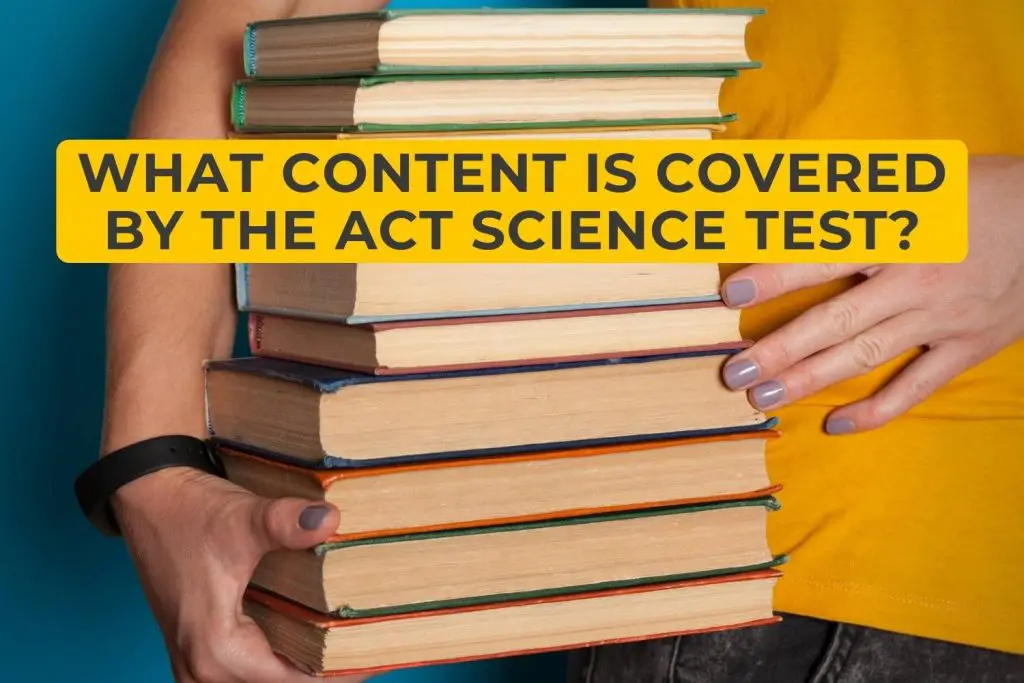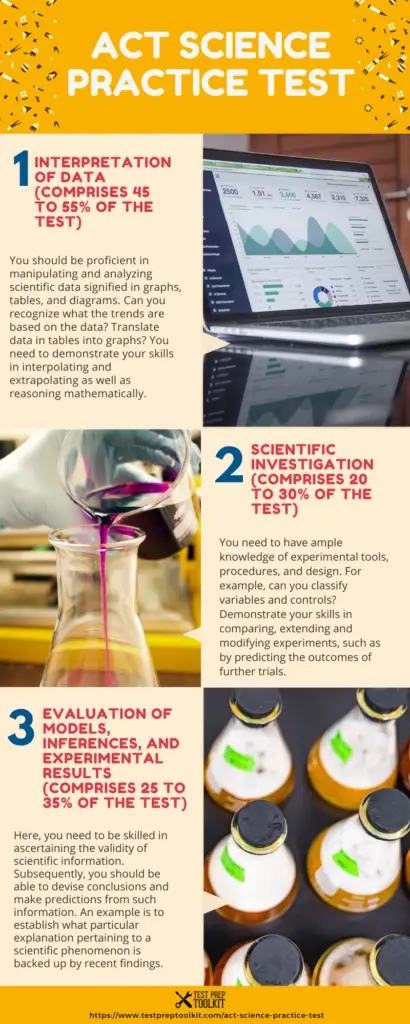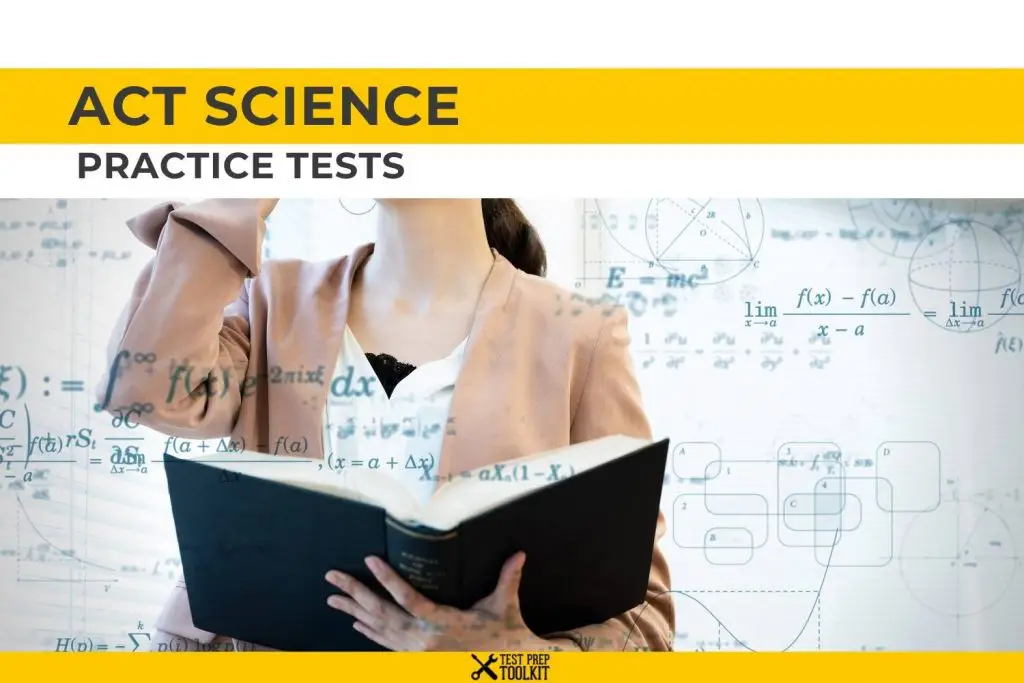Although the ACT Science test is an open book test, you shouldn’t get complacent. If you want to get a high ACT score, it is imperative that you engage in effective test prep. Studies have cited that 30% of a good ACT study program is comprised by taking practice tests.
- ACT Science Practice Test 1
- ACT Science Practice Test 2
- ACT Science Practice Test 3
- ACT Science Practice Test 4
- ACT Science Practice Test 5
Prepare To Score Big On The ACT Science Test By Taking Practice Tests

After all the plethora of scientific facts that you’ve tackled in high school, you might have a lot of qualms about taking the ACT Science test. But fret not- you will not be required to do a rote recall of complex scientific concepts in it. What the ACT Science test aims to assess is your proficiency in looking up and synthesizing information contained in passages, illustrations, graphs, and tables.
Studies have cited that 30% of a good ACT study program is comprised by taking practice tests. Why? Because practice, as they always say, makes perfect. The no. 1 rule in pacifying your test anxiety is to know what to expect in your academic undertaking. That’s what ACT Science practice tests can do: educate you about what to expect in the actual test. Then you’re one step ahead of the game.
We have Practice Test that you can use: ACT Science Practice Tests 1
Pick An ACT Science Practice Test Here (link to TPT ACT Science Practice Tests)
What’s In The ACT Science Test?
Here’s a brief description:
There are 40 questions that comprise the ACT Science Test that you have to finish responding to in 35 minutes. Your skills in interpreting, analyzing, evaluating, reasoning and problem-solving pertaining to the natural sciences will be measured in this test.
Various sets of scientific information are presented in the test with each of them followed by a series of multiple-choice test questions. Three different formats signify these scientific information, and namely they are 1) data representation such as tables, graphs and other schematic forms, 2) research summaries such as descriptions of varied related experiments, and 3) conflicting viewpoints that express a number of related views or hypotheses that are contradictory to one another. The questions aim to evaluate how well you are cognizant and comprehend the basic features and concepts that pertain to the presented information. Can you critically examine how the provided information and the derived conclusion or developed hypotheses relate to each other? You should be able to generalize and obtain new information from a given one. Other than drawing conclusions, you will likewise be asked to make predictions. In some of the test items, you should be able to deliver knowledge about discipline-specific content. The ACT Science test assesses science content in congruence with science skills and practices.
Start reviewing with our helpful contents: ACT Science Practice Tests 2
What Content Is Covered By The ACT Science Test?

The subject areas covered by the ACT Science test include:
- Biology
- Chemistry
- Physics
- Earth/Space Sciences
Test takers are not required to have advanced knowledge in these subjects. However, some of the questions need reference from general and introductory science courses. Instead of a recall of scientific concepts, complex math skills and reading ability, the test emphasizes science skills and practices. The use of the calculator is not permitted in the ACT test.
There are 4 scores that will be reported in the ACT Science test – one is the total score for all the 40 multiple-choice test questions, and 3 category scores garnered from scientific knowledge, skills, and practices.
Check our ACT Science Practice Tests
Interpretation of Data (comprises 45 to 55% of the test)
You should be proficient in manipulating and analyzing scientific data signified in graphs, tables, and diagrams. Can you recognize what the trends are based on the data? Translate data in tables into graphs? You need to demonstrate your skills in interpolating and extrapolating as well as reasoning mathematically.
Scientific Investigation (comprises 20 to 30% of the test)
You need to have ample knowledge of experimental tools, procedures, and design. For example, can you classify variables and controls? Demonstrate your skills in comparing, extending and modifying experiments, such as by predicting the outcomes of further trials.
Visit our website: ACT Registration And Requirements
Evaluation of Models, Inferences, and Experimental Results (comprises 25 to 35% of the test)
Here, you need to be skilled in ascertaining the validity of scientific information. Subsequently, you should be able to devise conclusions and make predictions from such information. An example is to establish what particular explanation pertaining to a scientific phenomenon is backed up by recent findings.
The 3 Different Passage Formats Utilized In The ACT Science Test

- Data Representation (30 to 40%): Graphs and tables are used to convey information in this format, similar to those featured in science texts and journals. These measure your skills in reading graphs, interpreting scatterplots and tabular information.
- Research Summaries (45 to 55%): This format describes varied interrelated experiments. The succeeding questions of the passage concerns experiment designs and how experiment results are interpreted.
- Conflicting Viewpoints (15 to 20%): The ways views and hypotheses are expressed are presented by this format. They are to be determined as being incoherent with one another because they are derived from divergent premises or insufficient data. Questions following the pertinent passage relate to how you understand, analyze and compare alternative hypotheses or viewpoints.
Check our ACT Practice Test
Pick An ACT Science Practice Test Here (link to TPT ACT Science Practice Tests)
Related Topics:
- How To Improve ACT Science Score
- ACT Science Practice Tests 3
- ACT Math Test Overview, Content-Type, And Tips To Score High
- ACT Reading Test Basics & Practices to Improve Scores
- ACT Science Test
- ACT Science Practice Tests 4
- ACT Scores
- ACT Science Practice Tests 5









